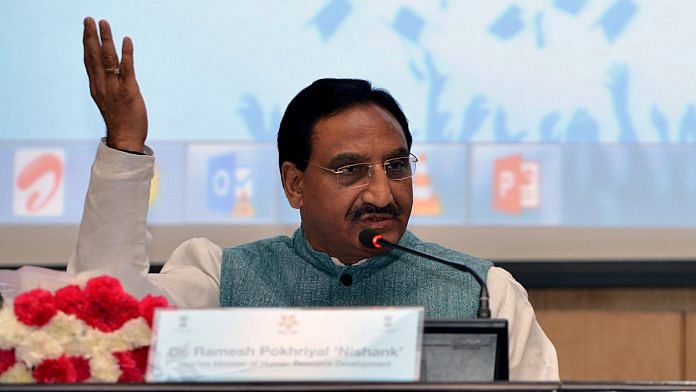New Delhi: With concerns around the introduction of mother tongue as medium of instruction in schools, Union Education Minister Ramesh Pokhriyal ‘Nishank’ has said the National Education Policy (NEP) will be uniformly implemented across all Indian schools keeping the “diversity” in mind.
“Understanding the diversity and inter-state migration, the policy recommends that ‘wherever possible’, the medium of instruction until at least Grade 5, but preferably till Grade 8 and beyond, will be the home language/mother tongue/local language/regional language,” he said in an email interview to ThePrint Thursday.
With the emphasis on “wherever possible”, the minister didn’t directly answer the concerns that elite schools could choose not to implement the NEP advice of using the mother tongue/regional language/local language as the medium of instruction until Class 5.
Education experts have welcomed the overall policy, but the medium of instruction point has remained contentious. There are concerns that underprivileged children could be at a disadvantage if they are deprived of the English language as the medium of instruction until class 5.
Most schools in India, however, already follow the mother tongue or local language formula.
In the interview, Pokhriyal answered several other questions about the policy that was launched last week in a bid to transform the Indian education system.
Also read: All about 3-language formula, the bone of contention between Centre & southern states
On NEP implementation
Asked about how the government hopes to implement the NEP, given that the policy carries no specifics on this even as it mentions it in chapter 27, Pokhriyal said a strategy will be prepared.
“A detailed implementation strategy will be developed in consultation with all States and UTs for the implementation of NEP 2020,” he said.
Other stakeholders have said the policy must be taken to Parliament for discussion. To this, the minister said, “The New Education Policy was approved by the Cabinet on 29th July 2020.”
On education budget and commercialisation
The NEP seeks to raise the education budget to 6 per cent of India’s GDP, calling for a law to this effect.
Asked about this, Pokhriyal said, “The Centre and the states will work together to increase public investment in the education sector to reach 6% of GDP at the earliest.”
A reference to “private philanthropy” in the NEP has raised fears that it could lead to further commercialisation of the education sector. However, the minister said multiple mechanisms with checks and balances will combat and stop this.
“An effective quality self-regulation or accreditation system will be instituted for all stages of education including pre-school — private, public and philanthropic — to ensure compliance with essential quality standards,” he said.
Asked if education is meant to be a non-profit venture, he said, “The NEP states that education is a public service rather than commercial activity or a source of profit. This is imperative in order to enable access to quality education for all… Education must be considered a basic right of every child.”
Also read: Scrapping MPhil won’t impact current students, admissions may stop from next year, says UGC
‘On non-teaching activities and multi-disciplinary institutes’
According to the NEP, teachers in Indian education system will no longer be involved in non-teaching activities.
Asked if this means they won’t be given election or survey duties in the future, Pokhriyal said, “To prevent the large amounts of time spent currently by teachers on non-teaching activities, teachers will not be engaged any longer in work that is not directly related to teaching.”
The policy also seeks to convert all higher education institutions into multidisciplinary institutions, leading to worries that it could lead to their deterioration. The minister called it the need of the hour.
“The need for developing multidisciplinary universities also stems from the impact created by the corona pandemic where the crisis was converted into opportunities by IITs followed by many HEIs,” said Nishank.
He cited the example of cost-effective products these institutions came up with to combat the Covid-19 pandemic. He said it would have been difficult to deal with a subject that has medical, technical, psychological as well as social perspectives had it not been for the multidisciplinary nature of the universities.
“India needs more universities of such kinds which can contribute to the society as and when needed,” he said.
Also read: NEP plans to integrate AYUSH & modern medicine, allopaths say it’ll produce ‘official quacks’



